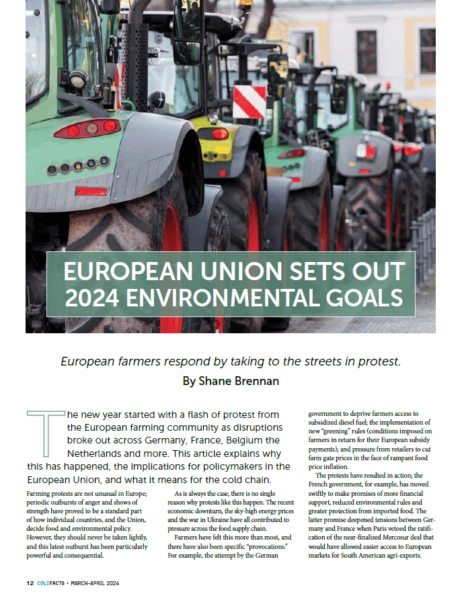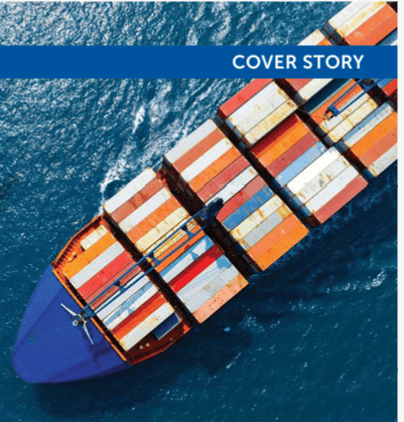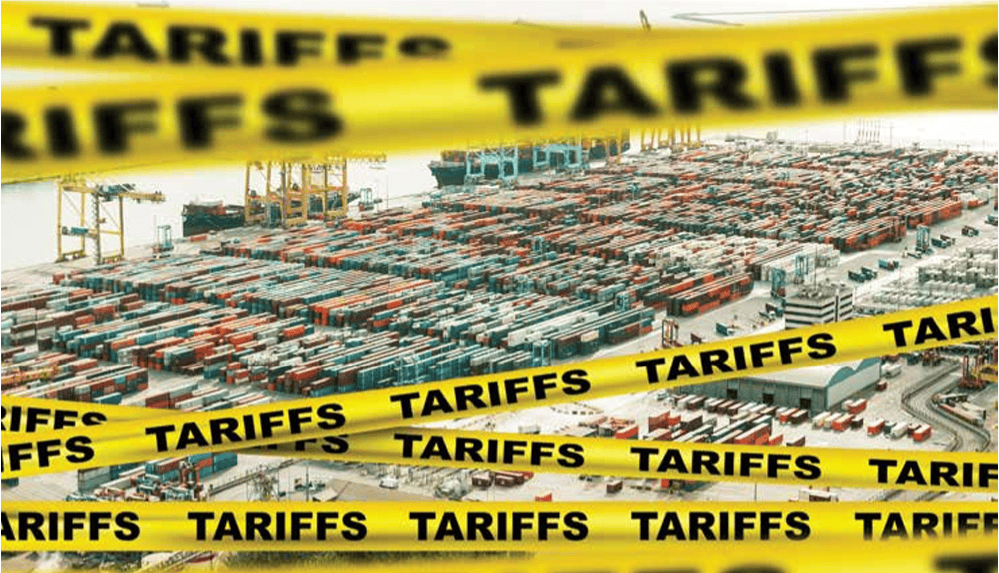From COLD FACTS Magazine (Click Image)
Read Below:
European Union Set Out 2024 Environmental Goals
European farmers respond by taking to the streets in protest.
By Shane Brennan
The new year started with a flash of protest from the European farming community as disruptions broke out across Germany, France, Belgium the Netherlands and more. This article explains why this has happened, the implications for policymakers in the European Union, and what it means for the cold chain.
Farming protests are not unusual in Europe; periodic outbursts of anger and shows of strength have proved to be a standard part of how individual countries, and the Union, decide food and environmental policy. However, they should never be taken lightly, and this latest outburst has been particularly powerful and consequential.
As is always the case, there is no single reason why protests like this happen. The recent economic downturn, the sky-high energy prices and the war in Ukraine have all contributed to pressure across the food supply chain.
Farmers have felt this more than most, and there have also been specific “provocations.” For example, the attempt by the German government to deprive farmers access to subsidized diesel fuel; the implementation of new “greening” rules (conditions imposed on farmers in return for their European subsidy payments); and pressure from retailers to cut farm gate prices in the face of rampant food price inflation.
The protests have resulted in action; the French government, for example, has moved swiftly to make promises of more financial support, reduced environmental rules and greater protection from imported food. The latter promise deepened tensions between Germany and France when Paris vetoed the ratification of the near-finalized Mercosur deal that would have allowed easier access to European markets for South American agri-exports.
The protests have also had an immediate impact on European policymaking. The Commission has launched a new “Strategic Dialogue” with the food sector on how Europe can support sustainable food systems in the future. The cynic would say this is an obvious tactic, from politicians under pressure in an election year, to defuse tension and delay controversial choices. But it is also hard to see any other way to take on challenging issues and attempt to find better, more consensual, solutions.
This all happened as the EU Commission published recommendations for what Europe needs to do by 2040 to meet its legislated goal of a net zero economy by 2050. GCCA has provided a full analysis of this statement to members, and it is available on our website.
Notably, the Commission changed that document to reduce the ambition and goals it suggests for EU farming and food production. Supporting farmers in their main job to produce food is emphasized, as opposed to proposals we know remain under consideration, such as taking more of Europe’s farming land out of production, restructuring farming subsidies, reducing fertiliser use and driving changes in consumer diets.
The focus is on achieving “food sovereignty,” which is a new, elegant way to express the imperative to ensure that Europe promotes domestic food production. This sentiment can come dangerously close to confusing “self-sufficiency” – the reliance solely on domestically produced food; and “food security” – ensuring that the population has access to sufficient, consistently available, affordable food. The reality of a secure future for the European food system is a well-planned and managed balance between domestically sourced, imported and exported food.
This shift in political emphasis is not only a reminder of the hard political power that farmers hold over the debate in Europe (as they do in most places around the world) but also a reminder that food matters. The delivery of food security is at the core of cold chain operators’ purpose, relevance and mission. Whether economic and trade policy boosts domestic production or promotes imports and exports, it requires a well invested and resilient logistics infrastructure.
As we enter this crucial election year, the food industry has made its voice heard loud and clear. As the conversation rolls on, GCCA will ensure the cold chain’s role and needs are fully heard and understood.




